Là où les voix sont souvent réduites au silence, la FEMED se rend présente pour écouter, soutenir,
et agir en faveur de la vérité et de la mémoire des victimes directes et indirectes des disparitions forcées et involontaires.
2024
Du 20 au 22 décembre 2024, la FEMED a mené une mission à Istanbul pour renforcer le soutien à ses associations membres engagées contre les disparitions forcées. Cette mission a également jeté les bases d’un réseau d’associations en vue de l’Assemblée des Femmes Défenseurs des droits humains. Durant cette mission, plusieurs rencontres cruciales ont eu lieu, dont la réunion avec le centre Hakikat Adalet Hafıza Merkezi
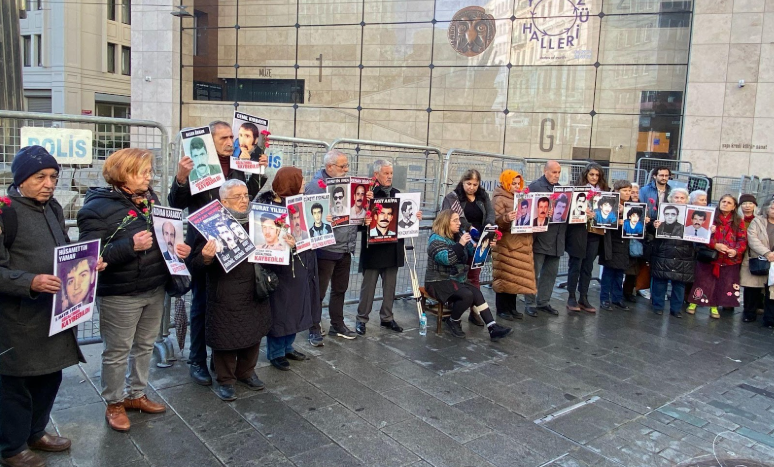
(Centre Vérité, Justice et Mémoire), qui a permis la mise en lumière du travail de documentation rigoureux mené par cette organisation, malgré les pressions étatiques. Via cette collaboration, la FEMED s’est engagée à réexaminer certains dossiers afin de les porter devant des instances internationales, tout en soutenant leurs initiatives de sensibilisation. La réunion avec l’association Anka-Der a été un autre moment fort, permettant d’aborder les besoins pressants des familles des disparus, et notamment judiciaires. Le dialogue a souligné l’importance d’un soutien international, ainsi que le renforcement de la participation d’Anka-Der à des actions internationales comme, par exemple, l’Examen Périodique Universel (EPU). Les discussions avec des associations comme TJA (Mouvement des Femmes Libres) et Kadın Zamanı (Le temps des femmes) ont également permis de mettre en exergue les défis spécifiques rencontrés par les femmes, particulièrement dans les communautés kurdes, et l’urgent besoin de solidarité internationale pour contrer la répression étatique.
Enfin, la mission a permis d’établir des ponts avec le Families for Freedom Movement (Mouvement des Familles pour la Liberté), où les témoignages poignants de femmes syriennes ont rappelé la douleur persistante causée par les disparitions forcées. Les discussions ont mis en avant des besoins concrets, comme la documentation médico-légale et le soutien aux démarches administratives des familles, pour lesquelles la FEMED s'est engagée à mobiliser son réseau international. Cette mission en Turquie a renforcé le rôle central de la FEMED dans la lutte contre les disparitions forcées en établissant des partenariats stratégiques, en renforçant les liens avec nos associations membres et en élargissant notre réseau d’organisations.
2014
FEMED visited Turkey for a third time, in Istanbul in April 2014 (from April 25 to 27) to meet families of the disappeared, family associations, its member and partner associations and other human rights defenders in Turkey. During the three-day mission, FEMED was able to reaffirm its support for its member associations in Turkey, maintain links with its partner associations, meet potential new partners, etc. The mission also provided an opportunity to update the situation and local specificities in Turkey concerning the fight against enforced disappearances and the defense of human rights in general.
The FEMED delegation also took part in a demonstration for truth and justice for all those who disappeared in Turkey. Rachid El Manouzi, Vice-Chairman of the FEMED, recalled that this fight was carried and supported by all the members of the Federation from different backgrounds, but united "by a common struggle and will". He reaffirmed the importance of this solidarity between families in the Euro-Mediterranean region, which keeps hope alive in all circumstances.
2012
Depuis plusieurs mois, les forces de police turques procèdent à des arrestations ciblées et massives contre des militants des droits de l’Homme kurdes en Turquie. Cemal Bektas, membre du Conseil d’administration de la FEMED a été arrêté à Istanbul le 11 octobre 2011. Son arrestation n’est pas isolée. C’est en réaction à ces arrestations que la FEMED a décidé de se rendre en Turquie afin d’organiser plusieurs rencontres en donnant la priorité à ses associations membres. Cette dernière s’est longuement entretenue avec l’avocat de Cemal Bektas.
La FEMED a rendu visite à ses associations membres afin de leur renouveler son soutien et de renforcer les liens avec ces dernières. Elle a également rencontré plusieurs journaux et agences de presse afin de mieux comprendre la situation actuelle en Turquie. Le procès des défenseurs des droits de l’Homme a débuté en juillet 2012. La FEMED a dépêché sur place un avocat afin qu’il puisse la représenter sur place et observer le procès pour notifier les violations des règles du procès équitable et du droit de la défense. Cependant, le procès a été repoussé au mois d’octobre 2012. La FEMED a donc envoyé à nouveau un avocat pour observer le procès.
2009
La FEMED s’est rendue une première fois en Turquie en octobre 2009 afin de préparer la Troisième rencontre euro-méditerranéenne des familles de disparus. A cette occasion, la Fédération a tenu à Istanbul des rencontres avec les associations locales ce qui a notamment permis d’assurer le suivi de la mission de décembre 2008. Du 3 au 7 décembre 2009 , une délégation de la FEMED s’est donc rendue en Turquie, à Istanbul et dans le Sud Est du pays, à Diyarbakir, afin d’y rencontrer les mères de disparus qui, sur place, se battent quotidiennement pour que la Vérité et la Justice soient faites sur le sort de leurs proches.
Le Secrétariat de la FEMED avait organisé différentes rencontres entre les membres du Bureau Exécutif et des associations à Istanbul et Diyarbakir : Mères pour la paix, IHD, Mazlumder, Yakay-der, Human Rights Foundation of Turkey ainsi que plusieurs militants turcs des droits de l’homme. Toutes ces associations ont souligné les nombreuses violations des droits de l’homme qui meurtrissent ce pays mais aussi leur soutien à l’organisation d’une conférence sur la justice transitionnelle. A la suite de cette mission, l’association Yakay-der a transmis à la FEMED une cinquantaine de dossiers individuels de disparus afin qu’ils soient soumis au Groupe de travail sur les disparitions forcées et ou involontaires.
2022
Rencontre d’associations et parti-prenante à la lutte contre les disparitions forcées, Beyrouth, Liban. 2022. Le 13 novembre 2018 marque l’adoption par le parlement libanais de la loi 105. Cette loi institue une Commission nationale des disparus composée de dix membres ayant pour principale missionde faire la lumière sur le sort des disparus. La FEMED s’est félicitée de la création de cette Commission nationale pour les personnes disparues tant attendue par les familles qui espèrent que le fruit de son travail mettra fin à leurs souffrances et donnera des réponses aux questions qui ont troublé leur sommeil des années durant. Afin de renforcer les liens avec ses partenaires sur le terrain et de réfléchir conjointement aux différentes activités qu’ils pourraient développer, la FEMED a dépêché une petite délégation et rencontré diverses associations et parties prenantes à la lutte contre les disparitions forcées. Le constat fait par la FEMED est frappant : bien que rencontrant des difficultés à se mettre en place, cette commission souffle un réel vent d’espoir quant à l’éclatement de la Vérité sur les disparu.es au Liban.
2021
As usual, at the end of the training course in Iraq, a delegation made up of members of the Federation and local associations met the Iraqi authorities. Discussions focused on the new Iraqi law criminalizing enforced disappearance, which is due to be adopted in 2021. Although Iraq is a party to the Convention, it has not yet transposed the various provisions of the treaty into national law. After studying the draft law and considering its timidity, FEMED made a number of recommendations to the players we met.
2011
En novembre 2010, l’Irak a été le vingtième pays à ratifier la Convention internationale pour la protection de toutes les personnes contre les disparitions forcées. Cette ratification a entraîné l’entrée en vigueur de la Convention. De ce fait, la Fédération euro-méditerranéenne contre les disparitions forcées (FEMED) a estimé indispensable de mener une mission dans ce pays afin de se rendre compte sur place de la problématique des disparitions forcées.
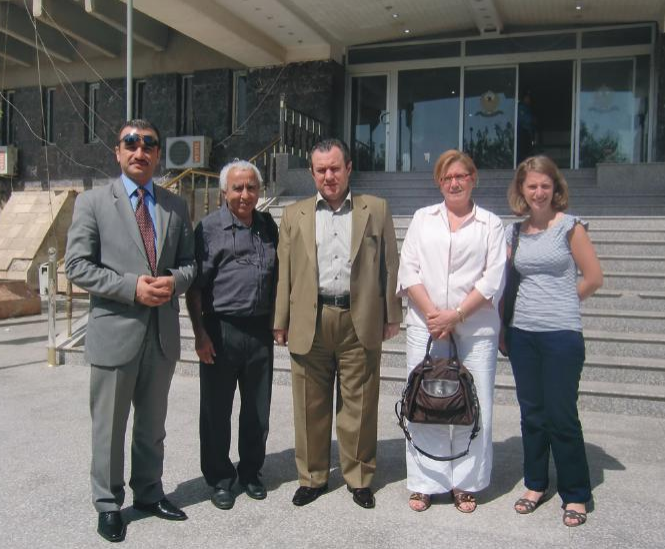
Du 8 au 11 septembre 2011, une délégation de la FEMED, composée de la Présidente, Nassera Dutour, du Secrétaire Général, Rachid El Manouzi, de Mohammed Kowthar, membre de l’association irakienne Al A’ata for Human Rights et du Conseil d’Administration de la FEMED ainsi que de la Chargée de Programme, s’est ainsi rendue au Kurdistan irakien. La mission s’est dé roulée dans la capitale du Kurdistan, à Erbil. La délégation s’est également déplacée à Kirkouk, ville au Nord de l’Irak afin de rencontrer des familles de disparus. En effet, c’est dans cette ville que l’on dénombre le plus de
victimes de disparitions forcées, qui ont eu lieu avant 2003 sous Saddam Hussein mais aussi après sa destitution. Un long travail de préparation en amont de la formation a été effectué par l’association membre de la FEMED, Al A’ata for Human Rights.
La délégation de la FEMED a rencontré différentes associations de défense des droits de l’Homme irakiennes : Kurdistan Anfal Victims Center, Centre des droits de l’Homme, Association Democracy and Development Organisation, International Commission on Missing Persons (ICMP), AlRahma, Kurdish Institute for victimology and fighting genocide. La délégation a également été reçue officiellement par des membres du Parlement du Kurdistan irakien ainsi que par Mme Lanja I. Dizayee, conseillère auprès du Ministère des martyrs et Anfal. A l’issue de toutes ces rencontres, il apparaît que malgré les avancées du gouvernement telles que la ratification de la Convention et le vote de lois sur les disparitions forcées et l’exhumation des fosses communes, un fossé se creuse entre ces gestes politiques et la réalité du terrain. En effet, les plaies de l’Histoire de l’Irak sont toujours ouvertes. Les séquelles des guerres qui ont ravagé le pays se font toujours ressentir. Les graves violations des droits de l’Homme durant le massacre des kurdes et les guerres successives n’ont pas encore été totalement reconnues. Les familles qui demandent inlassablement Vérité et Justice depuis plus de vingt ans ne baisseront pas les bras.
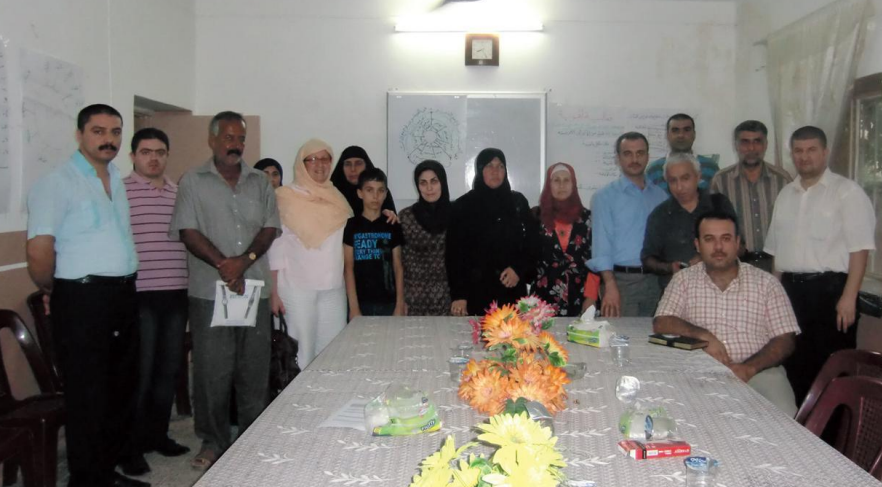
2019
A FEMED delegation visited Morocco from July 4 to 9, 2019, where it met with member associations, parliamentarians and political figures, to investigate the issue of enforced disappearance in Morocco. FEMED was able to note that many associations have united to work towards the creation of a new truth mechanism on serious human rights abuses in Morocco.
On July 6, 2019, FEMED met with families of the disappeared at AMDH headquarters. 7 women whose husbands were detained in Tazmamart gave their testimonies. FEMED reported that during the meeting with the CNDH, the President had promised to discuss with representatives of Tazmamart to find a solution to the issue of families who have not received compensation, as well as how to compensate victims who are now retired. FEMED reiterated the importance of joint action to achieve concrete results. The meeting was followed by a sit-in in front of the Moroccan Parliament.
Finally, the FEMED delegation met the Minister of Justice. The Minister praised the work of the IER and the CNDH, and assured them of the political will to resolve cases of enforced disappearance. He felt that the CNDH was the best structure to continue the work of the IER, and that many points of the Convention against Enforced Disappearances had been taken up in legislation. The Minister then reaffirmed his support for the associations, reminding them that he would listen to their recommendations.
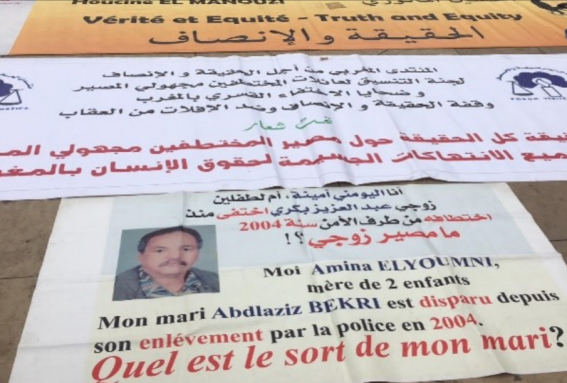
2019
On the first day of the FEMED president's arrival in Catalonia, an interview was organized with journalist Joan Roura, from TV3 - Televisio de Catalunya. She presented the FEMED, the CFDA, and spoke about the issue of the disappeared in Algeria, the Algerian context of the 90s and the current upheavals in Algeria (Bouteflika's 5th mandate, historic demonstrations). She held another interview with another newspaper, which ran an article on Sunday April 7, 2019.
Two other meetings took place with two guest Syrian activists. The first was with Fadwa Mahmoud, a Syrian refugee in Berlin, from the association Families for Freedom. Her son and husband disappeared after being arrested at Damascus international airport on their way back from a conference in China, during which they spoke about associations in Syria. The second meeting was with Meriem Alhallak of the Ceasar Families association. Her son was arrested and died under torture, from a haemorrhage. She suffered numerous threats and her house was bombed. She found herself on the street, and fled to Lebanon and then to Berlin.
Durant la deuxième journée de mission, la présidente de la FEMED s’est rendu au Parlement de Catalogne, en présence de 3 députés et de deux représentants de partis politiques. La présidente y a présenté la FEMED et le CFDA ainsi que leurs activités. Le débat a porté sur la question de la Syrie et de la problématique de la disparition forcée. Un appel a été fait à l’intention du gouvernement à cesser de faire passer les relations économiques avant tout. Fut organisée une réception à la mairie de Celra, commune près de Gérone, en présence du maire, de la maire adjointe et de journalistes. Au cours de cette rencontre, la FEMED s’est présenté et s’est ouverte une discussion sur l’Algérie, compte tenu du fait que ces décideurs politiques étaient peu informés du contexte des années 90 et des années noires.
Les Syriennes ont parlé des violations des droits de l’homme en Syrie, et de ce qu’elles même ont subi. A aussi été question d’un bus aménagé par des associations syriennes basées Londres, qui sillonne les villes d’Europe avec à son bord des photos des disparus et des familles de disparus en train de manifester. Le bus est accueilli dans de nombreuses villes, où sont organisées des rencontres avec diverses institutions. La troisième journée a été marqué par la rencontre et les échanges avec des ONG locales et régionales voir même internationales. D’autres interviews ont été fait avec des agence de presse active au niveau de la catalogne qui ont été suivi d’une conférence publique.
2015
Cette mission exploratoire en Jordanie s'est tenue du 1 au 2 juin 2015. La FEMED en a profité pour rencontrer plusieurs acteurs sur le terrain afin de faire le point sur les cas de disparitions forcées parmi les familles des réfugiés syrien. Tout d'abord, la FEMED a rencontré le "Danish Institute against torture" représentée par Elna Sondergaard. Celle-ci a attiré notre attention sur le fait que la Jordanie a accepté le principe de la ratification de la Convention internationale pour la protection de toutes les personnes contre les disparitions forcées. Son cas sera examiné en novembre 2015 par le Comité contre la torture.
FEMED also spoke to Sarah Avrillaud of the International Committee of the Red Cross and Red Crescent. This organization said it has access to detention centers and is trying to document cases of disappearances and re-establish family ties. They also want to improve detention conditions. They will try to put FEMED in touch with family groups if they are approached.
Finally, FEMED met Lubana Dawany, Executive Director of GISI in Jordan. The GISI representatives advised FEMED of the need to use Prince Zeid's presence as High Commissioner to push the Jordanian government to ratify international conventions, in particular the CED. In addition, the association is in contact with Syrian refugee women, and is increasingly aware of the suffering caused by the disappearance of one of their loved ones, and of their need for psychological support.
However, Vladimir JANECEK - Political Officer of the European Union delegation - drew FEMED's attention to the fact that the delegation is not working specifically on enforced disappearances, as Jordan is not directly concerned and no work has yet been done with Syrian refugees in Jordan on this subject.
2014
Lors de cette 2ème mission à Chypre en novembre 2014, la délégation de la FEMED, composée de Wadih Al Asmar, Secrétaire général de la FEMED, Annie-France Berthod, Trésorière de la FEMED et Charlotte Galloux, Chargée de programmes, a rencontré de nombreuses associations chypriotes turques et grecques.
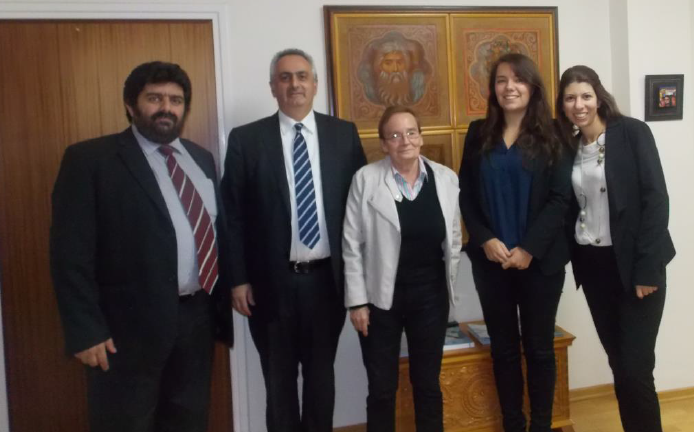
Toutes travaillant sur la problématique des disparitions forcées : Truth Now, Peace Research Institute Oslo PRIO Cyprus Centre, « Together We can » (Initiative of Bi-Communal Relatives of Missing Persons and Victims of War), ainsi que d'un journaliste, Andreas Paraschos, ayant travaillé sur la question des disparus.
The delegation also met Mr Photiou, Commissioner for Humanitarian Issues of the Republic of Cyprus, and the three members of the Committee on Missing Persons in Cyprus (CMP): Gülden Plümer Kücuk, Turkish Cypriot member of the CMP, Nestoras Nestoros, Greek Cypriot member of the CMP, and Paul-Henri Arni, third member of the CMP (United Nations).
2009
Particulièrement sensibilisée à l’expérience chypriote lors de la Conférence de Rabat, où des associations chypriotes turques et grecques étaient présentes, la FEMED a mené en mai 2009 une mission sur l’île de Chypre. Des membres du Bureau Exécutif, accompagnés de la Chargée de mission ont réalisé cette mission en vue d’acquérir des connaissances plus approfondies sur ce pays qui a mis en place un mécanisme original de justice transitionnelle.
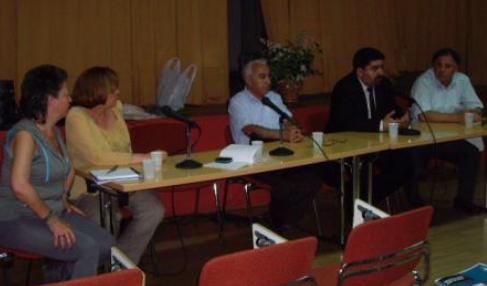
En effet, la mise en place d’un Comité pour les personnes disparues, où siègent les deux parties de l’île ainsi qu’une tierce partie, recommandée par le CICR et nommée par l’ONU, méritait toute l’attention de la Fédération. La FEMED a pu se familiariser avec la structure de ce mécanisme et mesurer son incidence sur les associations de familles de disparus. A l’occasion de cette mission, la FEMED a également rencontré le « médiateur » du Comité pour les personnes disparues, organe chargé des disparitions forcées sur l’île. La délégation de la FEMED a aussi mené plusieurs entretiens avec les deux associations chypriotes qui travaillent respectivement sur des cas de disparus de la partie sud et nord de l’île.
A conference on enforced disappearances in the Euro-Mediterranean region was also organized with the support of the Bicommunity Initiative for the Disappeared, a newly-created association bringing together the island's two communities. The FEMED delegation met a number of people working to eradicate enforced disappearances in Cyprus, including the International Center for Transitional Justice (ICTJ), the European Commission and embassies. Discussions were held with the Truth Now NGO, made up of lawyers and researchers interested in enforced disappearances, who are taking their case to the European Court of Human Rights.
2014
A FEMED delegation visited Belgrade, Serbia from July 21 to 23, 2014. The FEMED delegation met with various Serbian human rights associations, but also with various members of the Serbian Missing Persons Commission, members of the International Committee of the Red Cross etc. The mission was essentially one of gathering information on the challenges and obstacles that associations dealing with the issue of enforced disappearances have to overcome.
This field mission enabled FEMED to study and take note of all the issues surrounding enforced disappearances in the Balkans, and more specifically in Serbia. Several commissions have been set up in Serbia to search for people who disappeared during the war. Cooperation between FEMED and local Serbian NGOs such as the Association of Families of Kidnapped and missing persons has revealed that, despite Serbia's commitment to shedding light on the fate of those who disappeared during the war, serious institutional obstacles stand in the way of resolving the issue of the missing.
2013
Quelques mois après la chute du régime Ben Ali, une équipe de terrain de la FEMED s’est rendu à Tunis pour faire une cartographie de la situation des disparitions forcées dans le pays. S’il est difficile d’obtenir des statistiques fiables sur les disparitions forcées en Tunisie, la mission a permis de confirmer, au regard des sources disponibles, l’absence de phénomène et de la pratique systématique de la disparition forcée en Tunisie, malgré l’existence de quelques cas individuels. Plusieurs personnes rencontrées durant cette mission ont partagé le fait qu’une bonne partie des archives publiques et privées (notamment celles des douanes, des hôpitaux et de certains tribunaux) auraient été détruites peu après le 14 janvier 2011.
2013
The aim of this mission, which took place in 2013, was to establish initial contact with national institutions, international and local organizations, including associations representing the families of the disappeared, to understand the nature of their activities, the constraints these associations face and the challenges facing both these organizations and the families of the disappeared. Today, the number of associations working on the issue of enforced disappearances, transitional justice and reconciliation is estimated at over thirty in the country. It was not possible during this mission to meet directly with families of the disappeared, but contacts were established with several local associations. The delegation of the International Committee of the Red Cross (ICRC) in Tripoli also undertook to facilitate contacts with families of the missing.
Meetings with the authorities (Minister of Justice, despite a request for an audience, Minister of Martyrs and Missing Persons) were difficult to obtain due to the short duration of the mission and the current political situation, where some leading politicians are the subject of threats or even murder attempts, following the example of Mohammed Al-Megeryef, Speaker of the Assembly, who escaped a murder attempt on March 5 in Tripoli.
2012
Du 5 au 6 Avril 2012, la FEMED s’est rendue au Kosovo afin de mettre en lumière la complexe et douloureuse situation des victimes directes et indirectes des disparitions forcées qui persistent encore aujourd'hui, plus de deux décennies après la fin du conflit. À travers des rencontres avec des acteurs clés des discussions essentielles ont eu lieu sur les efforts de récupération et d'identification des victimes de cette tragédie humaine. Au premier jour de cette visite, la FEMED a pu rencontrer Ylber Morina, chargé de projet Justice et Société civile, et Amor koshi, coordinateur Médecine légale au sein de l’International Commission on Missing Persons (ICMP).
After welcoming FEMED to the premises of the International Commission for Missing Persons (ICMP), Ylber Morina and Amor Koshi presented the current situation in Kosovo with regard to enforced disappearances. During the conflict that ravaged Kosovo in 1999, some 4,400 people were registered as missing, and over 2,000 remain unaccounted for to this day. On the same day, FEMED met Prenkë Gjetaj, President of the Government Commission for Missing Persons in Kosovo. The problem of identifying the bodies thus arose. The Government Commission for Missing Persons in Kosovo coordinates all the partners working on the problem of body identification. The Red Cross was the first to work on this issue at the end of the conflict. It acted as an intermediary between the Serbian authorities in Belgrade and the authorities in Pristina.
Also discussed was the Federation's plan to organize a seminar in the Balkans to bring together associations of families of the disappeared from Bosnia-Herzegovina, Serbia and Kosovo on the subject of enforced disappearances. He expressed his enthusiasm for this project. Finally, the last day was devoted to meetings, first with the deputy mayor of Suhareka and then with the families of the town's missing.
2011
From April 17 to 20, 2011, a FEMED delegation visited Cairo. This long-planned mission gave FEMED an insight into the realities of enforced disappearances in Egypt. In the 1980s, when Hosni Mubarak came to power and a state of emergency was declared, there were many cases of enforced disappearance. At the time, however, it was very difficult to identify the associations working on this issue, in order to obtain concrete information on these cases of disappearance.
La délégation a rencontré différentes associations égyptiennes, des défenseurs, des militants des droits de l’Homme. La délégation a également été reçue par la directrice du département des droits de l’Homme à la Ligue arabe et le premier Secrétaire aux droits de l’Homme au Ministère des affaires étrangères égyptien afin de porter leur attention sur les disparitions forcées survenues avant, pendant et après la révolution. La ratification de la Convention Internationale pour la protection de toutes les personnes contre les disparitions forcées par les autorités égyptiennes est également un sujet qui a été abordé (l’Egypte n’a à ce jour en effet ni signé ni ratifié la Convention).
During these three days, the delegation was able to learn about the current political situation in Egypt and the serious human rights violations that took place there during the revolution. In order to strengthen the links created with the associations we met, and to ensure that the issue of enforced disappearances is more present in the demands of Egyptian society, it is essential for FEMED to continue its action in Egypt.
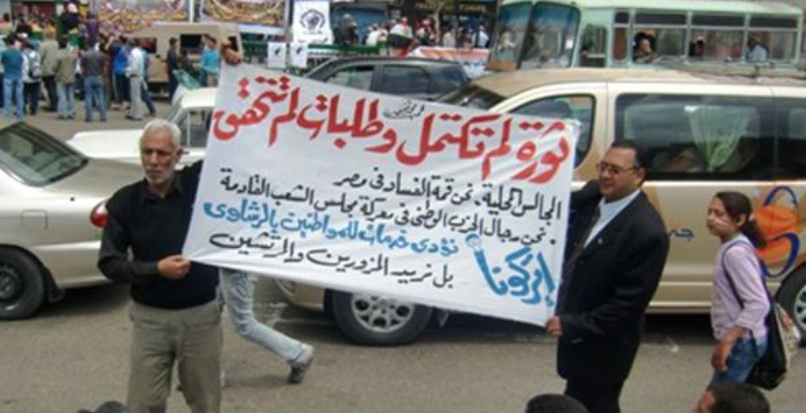
2010
As part of the cycle of seminars on forensic medicine and the identification of victims of human rights violations set up by FEMED, and following the first training course held in Morocco on June 12, 2010, the second training course for associations of the disappeared was held in Algiers on October 16, 2010. The 27 participants from Algerian civil society and medical circles were introduced to the various techniques for identifying victims: databases, DNA testing, anthropological and archaeological research.
Progress in the field of forensic medicine and the identification and reconstruction of the bodies of victims of human rights violations is nonetheless significant. Indeed, the International Commission on Missing Persons (ICMP) has identified over 8,000 bodies of victims of the conflict in Bosnia-Herzegovina. Silvana Turner, forensic anthropologist with the Argentine Forensic Anthropology Team (EAAF), presented the team's edifying work. EAAF's mission is to apply forensic anthropology and related sciences, in close collaboration with victims and their relatives, to recover and identify victims' bodies, return them to their families and provide evidence in legal proceedings. The work of forensic anthropology is divided into three phases.
Initially, the EAAF team analyzes the information gathered from relatives, official archives and NGOs in the field, to come up with a hypothesis as to the location of the graves and the identity of the bodies found. Once the graves have been located, the area is secured so that the painstaking work of exhuming the bodies can begin. Bones are then sealed and taken to the laboratory for analysis. During this final stage, various tests are carried out on the bones to identify the victims and determine the cause of death. However, the Algerian situation is complex, as there is a lack of political will to deal with the issue of the missing in general, and the identification of bodies in mass graves in particular. The more time passes, the more difficult it becomes to identify the bodies. By offering this training course in Algeria, FEMED has enabled associations of families of the missing and human rights activists to enhance their knowledge of the various techniques for identifying victims.
2009
In June 2009, on the occasion of its Board of Directors meeting in Algiers, FEMED met with various associations of victims' families: the Djazaïrouna and Somoud associations of victims of terrorism, as well as the relatives of the disappeared who make up its member association, Sos Disparus. The FEMED delegation also met lawyers Amine Sidhoum and Adnane Bouchaib, who work on the defense of victims of disappearance by agents of the state and of terrorism.
Lastly, a meeting was held with the delegate from the International Committee of the Red Cross, so that the Federation could be presented to him and Board members could become more familiar with the international organization's work in Algeria. The meeting also provided an opportunity to relay the demands of the Algerian families of the disappeared, namely that the ICRC should take charge of the file on enforced disappearances that occurred in the 1990s, which is not currently the case.
2009
In April 2009, FEMED led a mission to Bosnia-Herzegovina. Two members of the Executive Board, accompanied by the FEMED mission manager, met with various contacts. The logistics of the mission were facilitated by the informal partnership with the International Commission on Missing Persons (ICMP), established following the Rabat Thematic Conference, to which this organization had been invited.
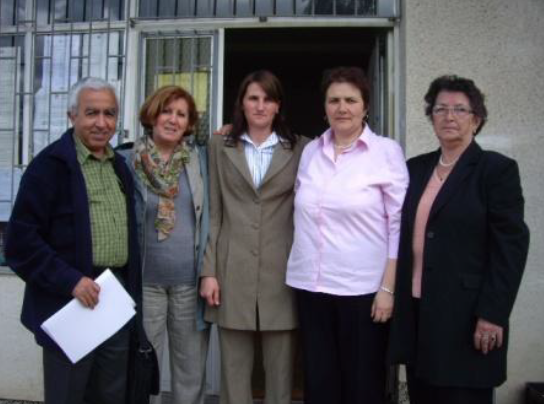
Several civil society organizations were met: the Regional Coordinating Committee of Associations of Families of Missing Persons from the Former Yugoslavia, the Citizens' Association "Women of Srebrenica", the Citizens' Association "Mothers of Srebrenica" (cf. photo left of FEMED delegation with members of the "Mothers of Srebrenica" citizens' association), the Association of Families of Missing Persons from the Sarajevo Romaninja region, the "Women of Prodinje" citizens' association, the Union of Bosnian Associations of Families of Captured and Missing Persons from Bosnia-Herzegovina.
The International Commission on Missing Persons (ICMP) Prodinje Identification Project and the ICMP Identification Coordination Division were also visited, enabling the delegation to see how Bosnian forensic expertise could be shared with other countries in the Federation. The delegation also visited the Potocari Memorial in Srebrenica and its cemetery. The members of the delegation were thus able to observe that Bosnian associations had a definite expertise on the theme of remembrance. This observation was of particular interest to the Federation, which would like to organize future exchanges of experience between its member associations on this theme.
During these talks with government authorities, FEMED met the Head of the Department for the Protection of Human Rights and the President of the Institute for Missing Persons. The FEMED delegation was thus able to relay the concerns of Bosnian families. It was also able to appreciate the way in which the authorities perceived and dealt with the problem of enforced disappearances, particularly during its awareness-raising work on the urgent need for Bosnia-Herzegovina to ratify the International Convention for the Protection of All Persons from Enforced Disappearance.
